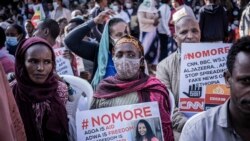The state of Africa's democracies - and the forces impacting them - was an important topic at U.S. President Joe Biden's two-day virtual Summit for Democracy.
The December 9 - 10 event drew in more than 100 nations around the globe. But only 15 African nations took part, mostly from the continent's southern regions.
In an interview with VOA’s Carol Van Dam, Joseph Siegle, Director of Research at the Africa Center for Strategic Studies in Washington DC says the White House held this summit to take stock of the challenges that democratic governments are facing worldwide.
This interview was edited for brevity and clarity.
Siegle on Summit's mission
I think the summit is aimed at reaffirming democratic principles and trying to bring like-minded countries together to reflect on the state of democracy and how to enhance it.
Siegle on participants pledges to end corruption
Corruption is an issue for good governance under all systems and it is a huge impediment for development. It is a key factor in instability in many countries around the world. Fortunately, in democratic systems there are more transparency and mechanisms to deal with corruption. They provide a more effective platform which you can use to address economic development, poverty alleviation and economic stability.
Siegle on authoritarian nations' influence in Africa
It is true that we have seen more assertive authoritarian influences in Africa, and I think Russia stands out in this regard. We see this in the Central African Republic and making efforts to do so in Mali and Russia is vying to have influence in Libya.
Siegle views on democracy in Africa
70% of Africans aspire for democratic systems in their countries even though they may not have experienced them. Or, feel like their governments are not yet democracies. This includes nations such as Sudan, Ethiopia, and Algeria. This [aspiration for democracy] is often led by young people. They have been very active, are more connected internationally, and know what governance norms are elsewhere.
They have higher expectations of their governments than previous generations. They demand accountability and transparency from their governments in a peaceful manner.
Siegle on Summit contributions to human rights in Africa
[The "health" of these African democracies] has implications for international governance in terms of security, respect for human rights and respecting the rule of law.
One summit alone is not going to make a difference. What matters is what happens after the summit when we see how democratic norms are practiced. We have seen a growing inclination of African governments and militaries to suppress democratic processes and so it is important following the summit that the U.S government and the international community push back against undemocratic maneuvers.







![U.S Summit to Improve Democracy in Africa [02:40] U.S Summit to Improve Democracy in Africa [02:40]](https://gdb.voanews.com/cc756a8c-b6fc-4a2d-a1fd-702cb07bdcf9_w250_r1.jpg)


![Biden Holds Virtual Democracy Summit [07:20]](https://gdb.voanews.com/d0ca8239-0174-48c7-9a09-07f669c44b31_w33_r1.jpg)